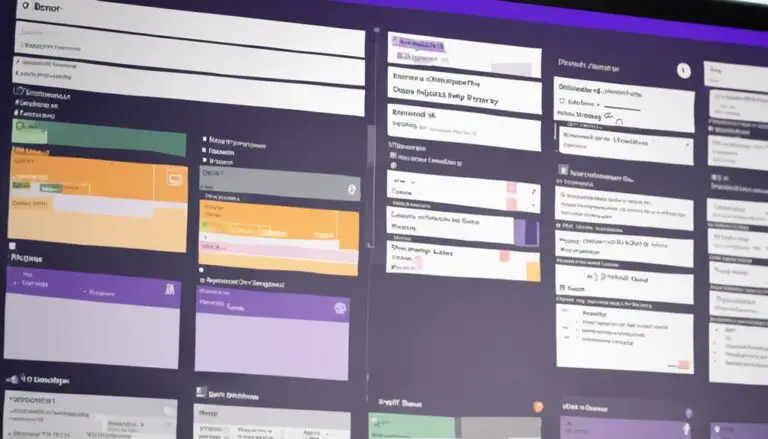You may be wondering how Kanban could possibly accommodate a Scrum Master, but the answer lies in a strategic approach that can revolutionize the way teams operate. By integrating kanban and scrum methodologies, a Scrum Master can still play a vital role in providing guidance and support to the team. Kanban’s focus on visualizing work and limiting work in progress complements the role of a Scrum Master, allowing them to facilitate continuous improvement and help teams identify and address bottlenecks in their workflow. This approach can enhance the effectiveness of both kanban and scrum methodologies, creating a powerful framework for agile project management.
By understanding the unique dynamics at play and the pivotal role a Scrum Master can play in enhancing Kanban practices, you'll unlock a world of possibilities for optimizing workflow efficiency and team collaboration.
Through this comprehensive guide, you'll gain insights into the seamless integration of Scrum principles into Kanban methodologies, ultimately paving the way for improved project outcomes and team performance.
Key Takeaways
- Scrum Master enhances collaboration and efficiency in Kanban.
- Promotes continuous improvement and agile practices.
- Drives accountability, ownership, and effective application of methodologies.
- Balances Scrum leadership principles with Kanban workflow visualization.
Key Differences Between Kanban and Scrum
When comparing Kanban and Scrum, it's essential to understand the fundamental differences in how they visualize workflow and structure project management methodologies. In Scrum, projects are broken down into user stories and managed through sprints with a reset board, while Kanban visualizes workflow using cards on a board with a continuous flow structure. The Kanban boards focus on limiting work-in-progress bottlenecks, promoting flexibility and adaptability in the process.
On the other hand, Scrum involves detailed planning and follows prescriptive processes to achieve project goals within specific time frames.
The Scrum methodology suits complex projects requiring faster delivery, whereas Kanban is more suitable for ongoing work visualization and minimal process overhaul. In Scrum, roles like Scrum Master and Product Owner are clearly defined, fostering a structured approach to project management. In contrast, Kanban encourages collaboration without specific roles, promoting a more fluid and adaptable work environment on the Kanban boards.
Understanding these key differences is crucial for choosing the right methodology that aligns with your project requirements and team dynamics.
Understanding the Scrum Master Role
To understand the Scrum Master role within Kanban teams, it's essential to recognize their pivotal function in ensuring adherence to Scrum principles while operating effectively at various organizational levels. The Scrum Master in Kanban teams plays a crucial role in:
- Accountability and Leadership: Emphasizing the importance of accountability, the Scrum Master leads the team towards achieving their goals within the framework.
- Team Effectiveness: Focusing on coaching, training, and facilitating, the Scrum Master enhances team effectiveness to drive continuous improvement.
- Organizational Support: Besides supporting the Scrum Team and Product Owner, the Scrum Master also serves the organization by promoting and driving agile practices.
In Kanban, the Scrum Master's responsibilities extend beyond mere meeting scheduling to encompass a comprehensive leadership role that ensures the team's success and the adherence to agile principles. Agile Coaches can also provide similar support and guidance to Kanban teams, reinforcing the importance of effective leadership and coaching within this framework.
Integrating Scrum Master Into Kanban
Integrating the Scrum Master into Kanban teams enhances overall efficiency and fosters a culture of continuous improvement and agile practices. The Scrum Master plays a crucial role in guiding Kanban teams towards adhering to agile principles and best practices, ensuring team effectiveness and continuous enhancement within the Kanban framework.
By actively participating in training, coaching, and facilitating meetings, the Scrum Master promotes enhanced team collaboration and workflow efficiency. Their presence emphasizes leadership, accountability, and the promotion of agile values within Kanban teams. Additionally, Agile Coaches can provide valuable support in implementing and optimizing Kanban practices, further enhancing the team's performance.
Collaborating with a Scrum Master in Kanban not only aids in the successful adoption of agile methodologies but also cultivates a sense of shared responsibility and commitment towards achieving organizational goals. Embracing the Scrum Master's guidance within Kanban teams can lead to increased productivity and a more streamlined workflow.
Benefits of Having a Scrum Master in Kanban
Fostering a culture of continuous improvement, a Scrum Master in Kanban teams enhances collaboration and efficiency, ensuring adherence to agile principles and practices. Here are some of the benefits of having a Scrum Master in Kanban teams:
- Supporting Continuous Improvement: Scrum Masters assist Kanban teams in identifying areas for growth and implementing changes to enhance workflow efficiency.
- Enhancing Collaboration: By promoting open communication and teamwork, Scrum Masters help Kanban teams work cohesively towards achieving their goals.
- Driving Accountability: Scrum Masters play a vital role in instilling a sense of ownership and responsibility within Kanban teams, leading to increased productivity and quality outcomes.
Having a Scrum Master dedicated to guiding Kanban teams can result in smoother workflows, reduced bottlenecks, and overall improved performance. Their presence ensures that agile methodologies are effectively applied, paving the way for successful project deliveries.
Challenges and Solutions in Kanban With Scrum Master
Navigating the challenges in Kanban with a Scrum Master involves understanding the pivotal role of the Scrum Master in team collaboration techniques. Balancing leadership responsibilities with the self-organizing nature of Kanban teams is key to overcoming obstacles.
Role of Scrum Master
To effectively navigate the challenges of incorporating Scrum practices into Kanban methodology, the Scrum Master must adeptly balance adherence to core principles while ensuring team effectiveness remains paramount. When facing the complexities of Kanban teams, the Scrum Master can collaborate with Agile Coaches for guidance and support. They can adapt Scrum practices to fit the Kanban framework seamlessly and emphasize leadership as outlined in the Scrum Guide.
- Collaborate with Agile Coaches for guidance and support.
- Adapt Scrum practices to fit the Kanban framework seamlessly.
- Emphasize leadership as outlined in the Scrum Guide.
Team Collaboration Techniques
In enhancing team collaboration within the Kanban framework alongside a Scrum Master, addressing challenges such as lack of clear roles, communication gaps, and conflicting priorities can lead to more effective outcomes.
The Scrum Master plays a vital role in facilitating communication, clarifying responsibilities, and promoting a culture of collaboration within the team. By resolving conflicts and fostering trust, the Scrum Master helps create a harmonious work environment where team members can work together seamlessly.
Through their leadership and coaching, Scrum Masters support Kanban teams in overcoming collaboration challenges, ensuring that everyone is aligned towards common goals. Embracing the guidance and support of a Scrum Master can significantly enhance teamwork, communication, and overall productivity in a Kanban setting.
Enhancing Workflow Efficiency With Scrum Master
Enhancing workflow efficiency with a Scrum Master involves guiding Kanban teams to optimize processes and foster continuous improvement. The Scrum Master's role is pivotal in ensuring that the team operates at its highest potential. Here's how they achieve this:
- Coaching and Guidance: The Scrum Master provides valuable insights and best practices to help teams enhance their workflow effectiveness.
- Facilitating Communication: By promoting open communication channels, the Scrum Master ensures that information flows smoothly within the team, reducing misunderstandings and delays.
- Resolving Bottlenecks: Identifying and addressing bottlenecks promptly is crucial for streamlining workflow processes and maintaining a steady pace of work.
Tools for Managing Scrum Master in Kanban
When managing a Scrum Master in a Kanban setup, consider utilizing tools like Trello, Jira, or Kanbanize to streamline tasks, track progress, and visualize work items effectively. These tools can aid in task assignment, monitoring workflow, and ensuring alignment with Kanban principles, enhancing the Scrum Master's support for the team.
Integration with project management software allows for seamless communication, transparency, and real-time updates to optimize workflow efficiency in a Kanban environment.
Kanban Board Integration
Consider utilizing Adobe Workfront for seamless integration of Kanban boards with Scrum Master management capabilities to enhance collaboration and productivity within your Kanban team. Workfront offers features tailored to support Kanban practices, making it a valuable tool for managing Scrum Masters in Kanban teams.
Here's how Workfront can help:
- Efficient Project Lifecycle Management: Align Scrum Master responsibilities with Kanban practices for smoother project execution.
- Enhanced Collaboration: Facilitate teamwork and communication by centralizing project information on Kanban boards.
- Improved Productivity: Streamline processes and increase visibility into task progress, empowering Scrum Masters to optimize team performance.
Integrating Kanban boards in tools like Workfront can significantly boost your team's effectiveness and overall project success.
Scrum Master Responsibilities
To effectively manage a Scrum Master within a Kanban environment, consider utilizing tools that enhance communication and collaboration while aligning with Scrum principles and team effectiveness. In Kanban, the Scrum Master plays a crucial role in ensuring that Scrum principles are upheld within the framework.
Tools like Agile Coaches can provide valuable support and guidance to Scrum Masters in Kanban teams, helping them navigate responsibilities that go beyond mere meeting scheduling. Accountability for team effectiveness lies with the Scrum Master, emphasizing the need for robust communication and collaboration strategies.
Furthermore, Kanban roles such as the Service Delivery Manager often mirror the responsibilities of a Scrum Master, highlighting the interconnectedness of roles within the Kanban environment.
Training and Development for Scrum Master in Kanban
Training and developing as a Scrum Master in Kanban demands a deep dive into understanding Kanban principles and practices to effectively visualize workflow, set WIP limits, and drive optimized flow within teams. To excel in this role, you'll need to focus on:
- Training and Coaching: Embrace learning how to coach teams on implementing Kanban practices and optimizing workflow for improved efficiency.
- Understanding Kanban Metrics: Dive into the significance of metrics like lead time and cycle time to make data-driven decisions and enhance team performance.
- Continuous Improvement: Master the art of facilitating continuous improvement and fostering collaboration within Kanban teams to drive innovation and success.
Continuous Improvement for Scrum Master in Kanban
Engage with your Kanban teams to foster a culture of continuous improvement and drive measurable enhancements in workflow efficiency and team performance. As Scrum Masters in Kanban, your role is crucial in guiding teams towards embracing Kanban practices and principles. By coaching teams on the nuances of Kanban, facilitating workshops, and providing training sessions, you empower them to understand and implement WIP limits and workflow control effectively.
To excel in this capacity, focus on explaining key metrics, offering data for analysis, and assisting teams in adapting to the Kanban methodology. Emphasize continuous learning and adaptation to enhance team effectiveness and overall performance. Encouraging a mindset of ongoing improvement won't only benefit the teams you work with but also contribute to your growth as a Scrum Master in Kanban.
Frequently Asked Questions
Is There a Scrum Master Role in Kanban?
In Kanban, there isn't a Scrum Master role. Instead, responsibilities are shared among team members. Kanban focuses on self-organization and flow efficiency. Agile Coaches or Kanban Coaches can provide guidance. Embrace the collaborative spirit of Kanban evolution and Scrum dynamics.
How Does Scrum and Kanban Work Together?
When Scrum and Kanban unite, collaboration benefits soar, creating a harmonious blend for continuous improvement opportunities. Teamwork amplifies, processes evolve, and value delivery excels. Join forces to unleash the power of agile synergy!
Is the Scrum Master Using the Kanban Board to Make Work?
You, as a Scrum Master, play a pivotal role in leveraging the Kanban board to track progress efficiently. Your responsibilities involve guiding the team in utilizing the Kanban board effectively, identifying bottlenecks, and enhancing collaboration for improved workflow.
What Are the Three Main Similarities Between Scrum and Kanban?
Imagine navigating the agile landscape with Scrum and Kanban. Both foster adaptability, visualizing work, limiting tasks, encouraging self-organization, and using metrics. They share core values of transparency, collaboration, and continuous improvement.
Conclusion
As you navigate the intricate dance between Kanban and Scrum, remember that the Scrum Master is your guiding light, your compass in the storm.
Like a skilled conductor leading an orchestra, they harmonize the team's efforts, ensuring smooth collaboration and efficient workflow.
Embrace the Scrum Master's role in your Kanban journey, and watch as your projects soar to new heights of productivity and success.
Trust in their guidance, and let the rhythm of agile practices guide you towards excellence.





